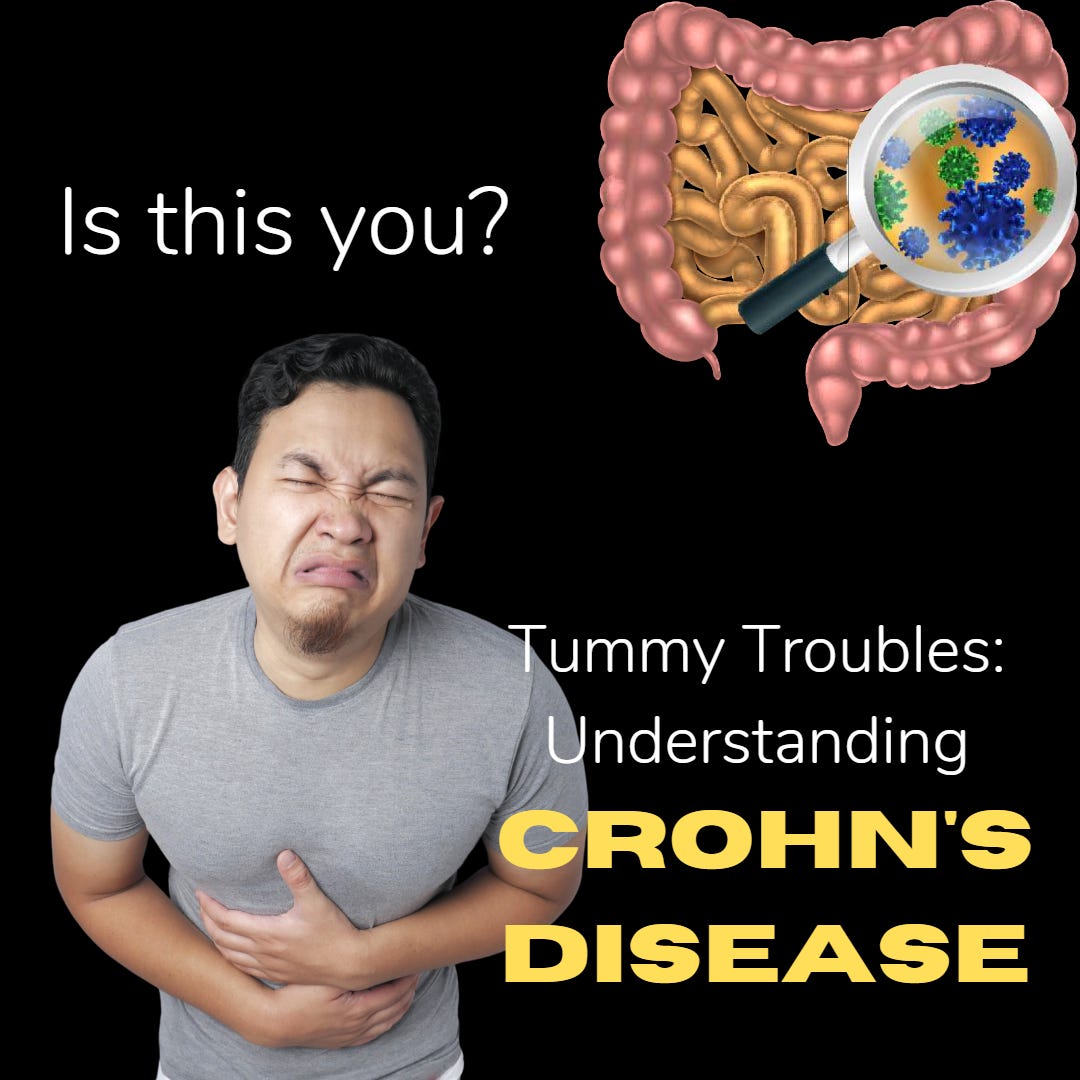🦠Gutsy Moves: How to Live Your Best Life with Crohn's Disease
"Tummy Troubles: Understanding Crohn's Disease"
Brief History of Crohn’s Disease
Crohn's disease was first described in 1932 by Dr. Burrill B. Crohn and his colleagues, Dr. Leon Ginzburg and Dr. Gordon D. Oppenheimer. They identified a group of patients with symptoms of abdominal pain, diarrhea, and weight loss, as well as inflammatory changes in the small and large intestines. They named this condition "regional ileitis" because it primarily affected the ileum, the final section of the small intestine.
Over time, it became clear that this condition was a distinct form of inflammatory bowel disease (IBD) and was not the same as ulcerative colitis, another type of IBD. In the 1960s, the term "Crohn's disease" came into use to describe this condition, in honor of Dr. Crohn's contributions to its understanding.
Since its initial description, our understanding of Crohn's disease has expanded significantly. We now know that it can affect any part of the digestive tract, from the mouth to the anus, and that it can cause a range of symptoms and complications. While there is still much to learn about the causes and treatment of Crohn's disease, ongoing research is helping to improve the lives of those living with this condition.
What is Crohn’s Disease?
Crohn's disease is an inflammatory bowel disease that can affect any part of the digestive tract, from the mouth to the anus. It is a chronic condition that causes inflammation, swelling, and irritation in the affected areas, leading to a range of uncomfortable symptoms.
Symptoms
The symptoms of Crohn's disease can vary widely from person to person but may include:
Family history of IBD
Smoking
Nonsteroidal anti-inflammatory drugs (NSAIDs)
Antibiotics
Stress
Diet
Abdominal pain and cramping
Diarrhea
Fatigue
Weight loss
Loss of appetite
Fever
Mouth sores
Joint pain
Skin rashes
Eye inflammation
Rectal bleeding
Symptoms can range from mild to severe and may come and go over time. In some cases, complications such as intestinal blockages or abscesses may occur.
Causes:
The exact cause of Crohn's disease is unknown, but it is believed to be the result of a combination of genetic, environmental, and immunological factors. It is not caused by stress or diet, although certain foods can trigger symptoms in some people.
Herbal Treatment
While there is no cure for Crohn's disease, some herbal remedies may help to alleviate symptoms and promote overall health. Examples include probiotics, aloe vera, and turmeric.
Probiotics: These beneficial bacteria can help to improve gut health and reduce inflammation.
Aloe vera: This plant has anti-inflammatory properties and may help to soothe the digestive tract.
Turmeric: This spice contains a compound called curcumin, which has anti-inflammatory properties.
It is important to note that while herbal remedies may offer some relief, they should not be used as a substitute for medical treatment.
Meet Tom and Sarah.
Meet Tom. Tom is a 35-year-old male who was diagnosed with Crohn's disease 10 years ago. He has a history of recurrent abdominal pain, diarrhea, weight loss, and anemia. He has been treated with various medications, including steroids, immunosuppressants, and biologics, but none of them have been effective in controlling his symptoms. He recently developed a perianal fistula that required surgical drainage and a temporary colostomy. He also has multiple strictures and ulcers in his small intestine that cause partial bowel obstruction and malabsorption. His condition is severe and affects his quality of life significantly.
Meet Sarah. Sarah was diagnosed with Crohn's disease in her 30s. She has found relief through a combination of herbal remedies and stress-reducing activities like yoga and meditation. She also works with her healthcare team to monitor her symptoms and adjust her treatment plan as needed. Sarah believes that taking care of her mental health is just as important as taking care of her physical health.
For more information on Crohn's disease, check out the Crohn's and Colitis Foundation. Some common myths about the condition include the belief that it can be cured through diet or that it only affects older people.
"Strength doesn't come from what you can do. It comes from overcoming the things you thought you couldn't." - Rikki Rogers
#CrohnsDiseaseAwareness #InflammatoryBowelDisease #IBDWarrior #GutHealth #ChronicIllness



